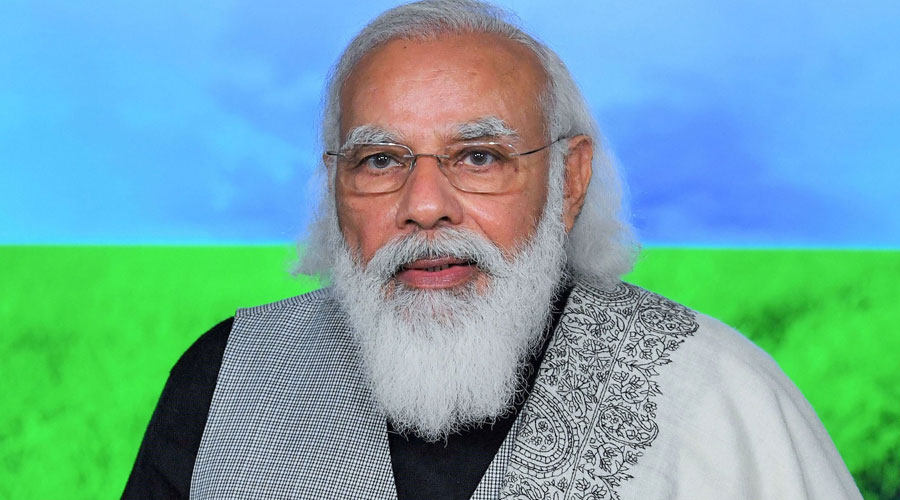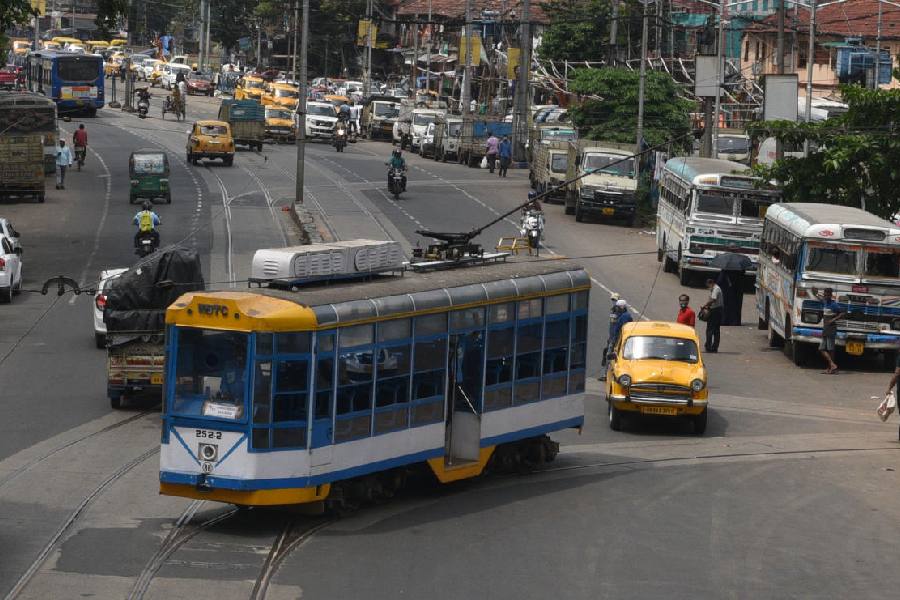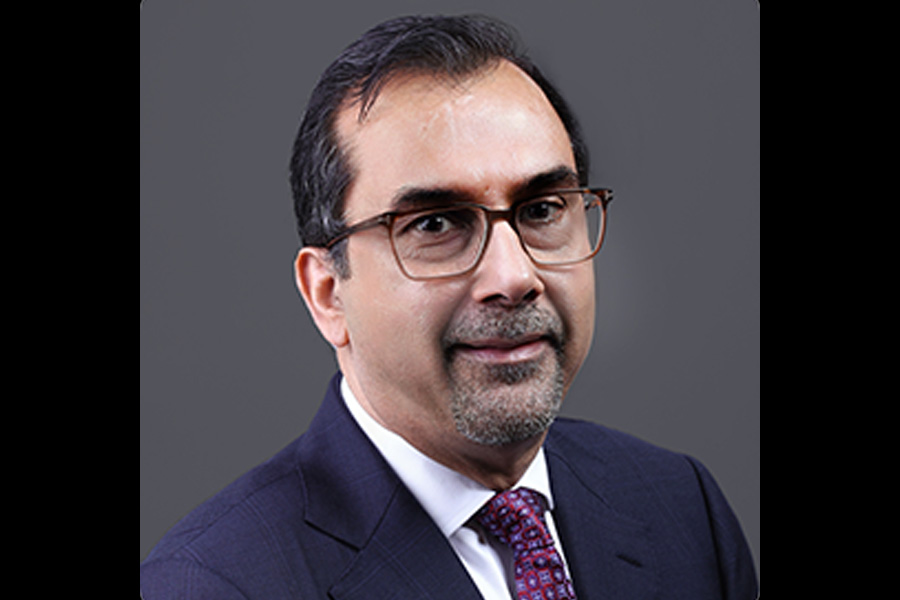Prime Minister Narendra Modi on Friday, yet again, firmly defended the farm laws, asserted that the government was ready for talks “with a open heart” and accused the Opposition of misleading the farmers for “political reasons”, as the administration and the BJP went all out to claim they had the majority of the cultivators behind them.
A routine government work of giving out doles was turned into a political spectacle aimed at not only countering the ongoing farmers’ protest at Delhi’s borders but also claim that an overwhelmingly large section of the peasantry was happy with the three new laws.
On former Prime Minister Atal Bihari Vajpayee’s birth anniversary, Modi released an instalment of Rs 2,000 into the bank accounts of each of 9 crore farmers under the PM Kisan Samman Nidhi scheme. Modi used the occasion to interact with and then address the farmers.
Ministers, chief ministers, MPs, MLAs and BJP leaders fanned out across the country to listen to Modi’s address on live screens along with gatherings of mostly farmers, according to the party. The government and party machineries were deployed to gather crowds at different locations across the country for the event. The BJP claimed that crores of farmers listened to Modi.
The overdrive appeared part of the sustained effort to discredit the protesting cultivators by indirectly claiming that “crores of farmers”, or a majority of them, were with the government. A BJP general secretary had claimed on Thursday that “just about 1 per cent of the country’s farmers” were protesting.
After releasing the money, Modi first interacted with select farmers from different states through videoconference and then delivered a speech. Home minister Amit Shah and defence minister Rajnath Singh were stationed at different locations in Delhi to interact with gatherings and listen to Modi’s speech with them. Transport minister Nitin Gadkari was sent to Assam on a similar mission and many other ministers were in their respective states or constituencies.
Modi’s speech, like many since the farmers’ protest started, had a twin purpose — to defend the new laws as a “game-changer” for farmers and slam the Opposition and accuse it of misleading the “bhole bhale (gullible)” farmers for “political gains”.
The agitating farmers have termed the laws “anti-farmer” and demanded that they be repealed.
Along with the wider Opposition, Modi on Friday singled out Bengal chief minister Mamata Banerjee and also the Left and accused them of misleading the farmers while ignoring the plight of tillers in Bengal.
“On every issue of farmers, the government is ready to talk with an open heart,” Modi said after launching his attack on the Opposition.
The government has been consistently following the carrot-and-stick policy. On the one hand it has been criticising the agitating farmers, saying they were being misled and used by the BJP’s political rivals and firmly defending the laws, and on the other saying it was ready for talks.
“I want to tell also those who are opposing us that the government is in favour of farmers and that it is ready for discussions, provided that the talks are based on sound arguments and facts,” Modi said.
Modi, like his party leaders have been doing, latched onto a protest by a section of farmers on Human Rights Day to claim that the peasants’ agitation was politically motivated. BJP leaders have been accusing the protesters of being “Khalistanis” and “Naxals”.
“The movement started with the demand for inclusion of MSP in the agri-laws. Then political people jumped in and they started demanding freedom of some who are in jail after being accused of violence. Then they started a movement against toll plazas,” the Prime Minister said.
Modi pointed out that he was not attacking the farmers but those political parties that were misleading them. He appealed to the farmers not to get misled and have faith in him.
While the Prime Minister defended the laws and urged farmers for talks, defence minister Rajnath tried to woo them by saying that the government would amend the laws after an year if they were not found beneficial.
Rajnath, while addressing a crowd at Delhi’s Dwarka where he had gone to listen to Modi’s speech, requested the farmers to try the new agri-laws as an experiment, stressing that the Prime Minister would never do anything that was against farmers.
Addressing farmers at Kishangarh village in Delhi, Shah said no corporate entity can snatch a farmer’s land as long as Modi was Prime Minister. The home minister asserted that the provision of minimum support price (MSP) would continue and mandis would not be shut down.
Modi’s interaction with select farmers appeared like an exercise to display how beneficial the farm laws were for the farmers.
He started with a farmer named Gagan in Arunachal Pradesh, who claimed he was a beneficiary of the PM Kisan Nidhi scheme and said he grew organic ginger and sold them in Bangalore and Delhi.
As soon as the farmer said he sold his produce in two big cities, Modi intervened and asked: “So you sell to private companies. Does the private company take only your ginger or your land too?”
Gagan replied that he had entered into a contract with a private company to sell his produce, and not the land. Modi said: “You, sitting in Arunachal, are confident that your land is safe but some people are spreading this misinformation that farmers’ land will go if they enter into a contract to sell the produce. So much lies are being spread.”
The other beneficiaries with whom Modi interacted appeared to have been picked carefully to ensure they hail the government’s existing schemes and also the new laws. The drift was that contract farming with private companies was more profitable. The agitating farmers have been saying the new laws are aimed at benefiting private companies as the government wants to slowly withdraw the MSP safety net.
During his interaction with Hari Singh, a farmer from Haryana’s Fatehabad, Modi appeared happy when he said that he grew fruits apart from paddy and wheat and sold them in the open local market at a good price.
The moment Hari Singh tried to say that he had sold his paddy for the MSP, Modi cut him short and congratulated him for the fact that he and his three brothers did joint farming and had not divided their land. He then switched to the next beneficiary from Odisha.
Though the government has been claiming MSP would continue, the agitating farmers fear that with no legal guarantee in the new laws, they would be forced to sell their crop to private entities at rates detrimental to them.
Farmers from Arunachal Pradesh, Haryana, Odisha, Tamil Nadu, Maharashtra, Madhya Pradesh and Uttar Pradesh figured in Modi’s interaction but none from Punjab, which has emerged as the epicentre of the protests against the new laws.










